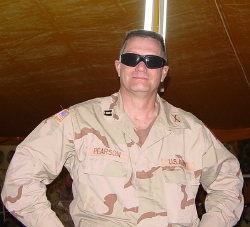Epilogue

The picture is of our last "home away from home away from home" in Iraq, what we called then The Tent of Tortured Souls and Eternal Darkness (photo by Alexis Geacintov.) Actually, the time there was anything but tortured, some pretty good friends lived there.
It’s been a few days since we got back to the States: still in the US Army, but no longer in Iraq. Gives one a chance to catch up a little on what the folks here in the US think about Iraq, and a chance to think back on what happened there, what we accomplished, what opportunities we may have missed.

According to the current media urban legend, we, as returning reservists, are supposed to be disillusioned. Sorry if we don’t fit the media’s “Broken Toy Soldier” stereotype, but, personally speaking, I feel rested, tanned, and fit. And, as to suffering from any malaise as a result of fighting what many political ideologues would like to describe as a hopeless war, let's take a look at the numbers, shall we?
1) regime change -- Saddam is under lock and key. His trial is underway.
2) weapons of mass destruction -- Iraq’s chemical weapons are now under US control – for example the huge chemical weapons complex southwest of Samarra. This chemical weapons complex was reported by Saddam to the UN back in the '90s. The difference is that now US forces are guarding it instead of Saddam's troops. According to UN reports, which are part of the public record, the complex houses about 5,000 122mm rockets filled with Sarin gas warheads. So, the next time someone tells you "There are no weapons of mass destruction in Iraq", ask him or her about the 5,000 nerve gas carrying rockets near Samarra.
3) democracy in Iraq -- with approval of the Iraqi constitution, following the elections earlier in the year, the process continues. The government there is slowly developing into a democracy, despite death threats from Zarqawi and his ilk. Even the Sunni minority participated in the October referendum.
That's three for three by my count. No so bad.

The job’s not done, but well under way. And, yes, we, the 8-229 AVN Flying Tigers, can take a little credit, I think fairly, for accomplishing this task. Of course, there are hundreds of thousands of other US military members who can, and should, make the same claim.

So, what happens next in Iraq?
I remember a friend of mine years ago arguing why Gorbachev should be the President of Russia. My response was that it didn’t matter who I thought or he thought should be the President of Russia. In a democracy, what was important was what the Russian people wanted. And, the vast majority thought at that time that Gorbachev was not the ruler they wanted to suffer under any longer.
Likewise, when someone asks me what I think should happen in Iraq, I’m likely to tell them it doesn’t matter what I think should happen there. What matters is what the people there think. But, we, as Americans, should be prepared to accept that the majority of Iraqis may not vote for something that we want.
For example, the very existence of Iraq.
One thing that strikes me is the fact that most people who live in the country we call Iraq really don’t give a hoot about the future of that entity. The vast majority, about 80% of the population, is made up of Shiites and Kurds. Mostly, they identify the nation of Iraq with the former regime of Saddam, and thoroughly hate his guts and his government. Their vision of the future is either a separate Kurdistan or some kind of an independent Shiite nation in the South.

The very odd thing is that two groups are very much opposed to this idea: the Sunnis (mostly pro-Saddam) and the US government.
Why it is that the US would desire the same thing as the 20% pro-Saddam minority is a little surprising, to say the least.
But, the US military has been winning the wars while the US State Department has been losing the peace for years now.
Hopefully, the American people will see the wisdom of letting the Kurds, Shiites and Sunnis who live in the nation we today call Iraq choose their own future.

